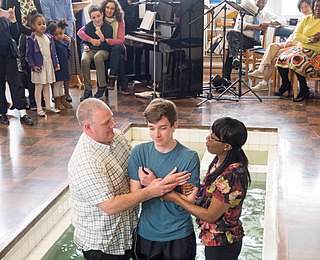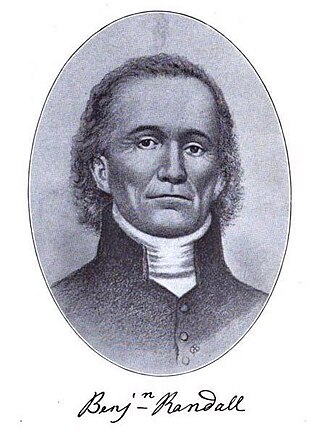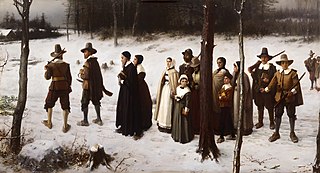History
The Old Baptist Union was founded in 1880, owing largely to the labours of Henry Augustus Squire, an itinerant preacher. Currently the Old Baptist Union has 16 member churches (in England and Wales) with about 700 members.
The churches of the Old Baptist Union are General Baptist, believing in general atonement (that in His death, Jesus atoned generally for the sins of all). They historically put more emphasis on the laying on of hands, divine healing and personal holiness than some other Baptist affiliations.
The Union is a member of both the Free Churches Council and the Evangelical Alliance, and most of its churches are members of local geographic Associations of the Baptist Union of Great Britain. Its government structure is somewhat of a combination between congregational and presbyteral, involving in each church the appointment of Elders. The Old Baptist Union's executive body is called the "Council of Management," and is composed of all the ordained officers of churches holding membership in the Union. An Annual General Meeting is held.

Arminianism is a branch of Protestantism initiated in the early 16th century, based on the theological ideas of the Dutch Reformed theologian Jacobus Arminius and his historic supporters known as Remonstrants. Dutch Arminianism was originally articulated in the Remonstrance (1610), a theological statement submitted to the States General of the Netherlands. This expressed an attempt to moderate the doctrines of Calvinism related to its interpretation of predestination.

Baptists form a major branch of Protestantism distinguished by baptizing professing Christian believers only, and doing so by complete immersion. Baptist churches also generally subscribe to the doctrines of soul competency, sola fide, sola scriptura and congregationalist church government. Baptists generally recognize two ordinances: baptism and communion.

The Baptist World Alliance (BWA) is the largest international Baptist organization with an estimated 51 million people in 2022 with 246 member bodies in 128 countries and territories. A voluntary association of Baptist churches, the BWA accounts for about half the Baptists in the world. It is the 8th largest Christian communion.
The Old Regular Baptist denomination is one of the oldest in Appalachia with roots in both the Regular and Separate Baptists of the American Colonies and the Particular Baptist of Great Britain. This group has seen a marked decline in its membership during the last two decades. The Old Regular Baptist Faith and order with her many branches and factions still remains the dominant Faith in some rural Central Appalachian Counties along or near the Kentucky Virginia border.

Regular Baptists are "a moderately Calvinistic Baptist sect that is found chiefly in the southern U.S., represents the original English Baptists before the division into Particular and General Baptists, and observes closed communion and foot washing", according to Merriam Webster. This definition describes Old Regular Baptists, not those who formed as a result of the Fundamentalist-Modernist controversy.

Free Will Baptists are a group of General Baptist denominations of Christianity that teach free grace, free salvation and free will. The movement can be traced back to the 1600s with the development of General Baptism in England. Its formal establishment is widely linked to the English theologian, Thomas Helwys who led the Baptist movement to believe in general atonement. He was an advocate of religious liberty at a time when to hold to such views could be dangerous and punishable by death. He died in prison as a consequence of the religious persecution of Protestant dissenters under King James I.

The General Association of General Baptists is a group of Baptists holding the doctrine of general atonement, whose membership is located mostly in the Midwestern United States.

General Baptists are Baptists who hold the general or unlimited atonement view, the belief that Jesus Christ died for the entire world and not just for the chosen elect. General Baptists are theologically Arminian, which distinguishes them from Reformed Baptists.

Baptists Together is a Baptist Christian denomination in England and Wales. It is affiliated with the Baptist World Alliance and Churches Together in England. The headquarters is in Didcot.

The Baptist Union of Poland is an association of Baptist churches in the country of Poland. It is a member of the Polish Ecumenical Council, the European Baptist Federation and the Baptist World Alliance. The headquarters is in Warsaw.

The Baptist Union of Sweden is the oldest of several Baptist bodies in Sweden.

The fundamentalist–modernist controversy is a major schism that originated in the 1920s and 1930s within the Presbyterian Church in the United States of America. At issue were foundational disputes about the role of Christianity; the authority of the Bible; and the death, resurrection, and atoning sacrifice of Jesus Christ. Two broad factions within Protestantism emerged: fundamentalists, who insisted upon the timeless validity of each doctrine of Christian orthodoxy; and modernists, who advocated a conscious adaptation of the Christian faith in response to the new scientific discoveries and moral pressures of the age. At first, the schism was limited to Reformed churches and centered around the Princeton Theological Seminary which had fundamentalist faculty members found Westminster Theological Seminary when Princeton went in a liberal direction. However, it soon spread, affecting nearly every Protestant denomination in the United States. Denominations that were not initially affected, such as the Lutheran churches, eventually were embroiled in the controversy, leading to a schism in the United States.
Derek John Tidball is a British theologian, sociologist of religion, and Baptist minister. From 1995 to 2007 he was the principal of London Bible College which later took the name London School of Theology.

The Baptist Church in Ukraine is one of the oldest and most widespread Evangelical Christian denominations in the country. Before the fall of the Soviet Union, over half the 1.5 million acknowledged Baptists and Pentecostals in the USSR lived in Soviet Ukraine. Prior to its independence in 1991, Ukraine was home to the second largest Baptist community in the world, after the United States, and was called the "Bible Belt" of the Soviet Union.
The National Council of Churches in India is an ecumenical forum for Protestant and Orthodox churches in India.

The United Church of Christ in the Philippines is a Christian denomination in the Philippines. Established in its present form in Malate, Manila, it resulted from the merger of the Evangelical Church of the Philippines, the Philippine Methodist Church, the Disciples of Christ, the United Evangelical Church and several independent congregations.

Protestantism is the largest grouping of Christians in the United States, with its combined denominations collectively comprising about 43% of the country's population in 2019. Other estimates suggest that 48.5% of the U.S. population is Protestant. Simultaneously, this corresponds to around 20% of the world's total Protestant population. The U.S. contains the largest Protestant population of any country in the world. Baptists comprise about one-third of American Protestants. The Southern Baptist Convention is the largest single Protestant denomination in the U.S., comprising one-tenth of American Protestants. Twelve of the original Thirteen Colonies were Protestant, with only Maryland having a sizable Catholic population due to Lord Baltimore's religious tolerance.
Orissa Baptist Evangelistic Crusade (OBEC) is a Baptist Christian church body in the state of Odisha in Eastern India. It is affiliated to the Baptist World Alliance. Its headquarters is in Bhubaneswar. OBEC has 405,000 baptized members and more than 650,000 total communicant members in 3,865 churches.








